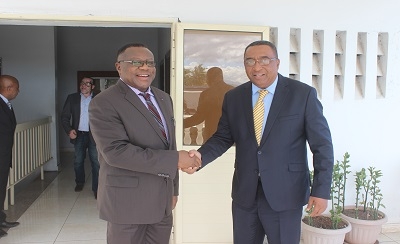
Moroni/Harare, 15 May 2017 (ACBF) – A brand new policy center to help the Government of Comoros achieve rapid milestones within its plan to become an emerging economy by 2040 as well as an initiative to compute the country’s institutional and human resource needs to meet its development goals, have been launched in the capital of the Indian Ocean nation.
These developments follow three days of intense capacity development encounters between the Government of Comoros and a team from the African Capacity building Foundation (ACBF) led by its Executive Secretary – Prof Emmanuel Nnadozie.
Comoros’s Center for Analysis and Research on Public Policies, which was launched at the weekend in Moroni with the technical and financial support of ACBF, comes in handy to support the country make much needed progress with its Accelerated Growth and Sustainable Development Strategy (SCA2D, in French) by conceiving, analyzing and evaluating relevant economic and social policies. The Think Tank will also boost the country’s institutional and human capacity for developing and implementing policies, improve informational processes meant to support SCA2D and promote multi-stakeholder participation in development dynamics through dialogue between the public and private sectors as well as civil society.
“We hope that this investment will be catalytic and will attract other donors,” said Professor Nnadozie, upbeat of greater things to come for Comoros which he described as a country with a high level of commitment for its capacity development.
Such an ambition is extremely important for Africa as a continent which still has an acute shortage of Think Tanks which he reckoned are “indispensable aid tools for decision making.” A comparison between the number of think tanks on public policy in sub-Saharan Africa and that of the USA alone, is extremely revealing of the lacuna of the developing continent. The USA as a country counts 1835 of Such Think Tanks while the whole of Sub-Saharan Africa has just 615.
The acute shortage of research centers to aid countries in policy formulation and implementation is further compounded by Africa’s limitation not only of crucial capacity to face today’s development challenges but also of the very understanding where such needs arise. This explains why the African Capacity Building Foundation has also capitalized on the mission to Comoros to partner with the Comorian Government to launch a study on the country’s capacity needs for development.
President Azali Assoumani, Vice President Ahmed Said Hassani Djaffar and their collaborators who had working sessions with the ACBF delegation to Moroni spoke of their total awareness of the country’s shortfall in institutional and human capacity to achieve its development plans and said they were highly committed to work with the Foundation to improve the situation.
Both parties agreed that for Comoros to make the great leap forward towards emergence, the country needs to improve on its domestic resource mobilization capacities. A major way to achieve this, they concurred, would be through a change of mindset especially with regards to paying taxes. This would call for an improvement in leadership at all levels and serious engagement with communities.
What’s pressing for the country now is for the country to earnestly “embark on a wide-scale capacity building campaign in order to respond to the legitimate expectations of people by creating the conditions for inclusive, strong and sustainable growth,” the ACBF Head said.
-ENDS HERE -
For more information, please contact:
Abel Akara Ticha – Senior Communication Officer
The African Capacity Building Foundation
Harare, Zimbabwe
+263 7+263-4 304663, 304622, 332002, 332014; Ext. 279
Email: A.Ticha@acbf-pact.org
About the African Capacity Building Foundation
Established in 1991, ACBF builds human and institutional capacity for good governance and economic development in Africa. To date the Foundation has empowered people in governments, parliaments, civil society, private sector and higher education institutions in more than 45 countries and 6 regional economic communities. ACBF supports capacity development across Africa through mobilization and leveraging of resources for capacity development; grants, investments and fund management; knowledge services; promoting innovation in capacity development and capacity development advisory services. The establishment of ACBF was in response to the severity of Africa’s capacity needs, and the challenges of investing in indigenous human capital and institutions in Africa. ACBF interventions are premised on four principles: the centrality of capacity to the development process in Africa; the critical role of a partnership and demand-driven approach in tackling capacity challenges; African ownership and leadership in the capacity development process; and a systematic, sequenced and coordinated approach to the capacity development process that pays attention to capacity retention and utilization. For further information go to: www.acbf-pact.org





